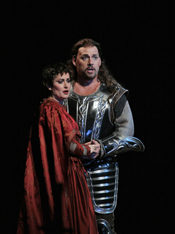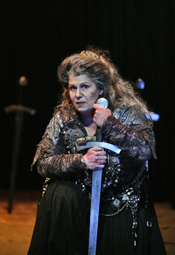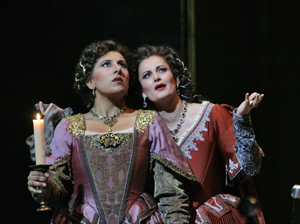
02 Apr 2007
San Diego Opera — Il Trovatore
Verdi's magnificent melodrama Il Trovatore may be the most masculine of his creations, but the production that San Diego Opera presented as the third opera of its 2007 season was a triumph for the ladies.
English Touring Opera are delighted to announce a season of lyric monodramas to tour nationally from October to December. The season features music for solo singer and piano by Argento, Britten, Tippett and Shostakovich with a bold and inventive approach to making opera during social distancing.
This tenth of ten Live from London concerts was in fact a recorded live performance from California. It was no less enjoyable for that, and it was also uplifting to learn that this wasn’t in fact the ‘last’ LfL event that we will be able to enjoy, courtesy of VOCES8 and their fellow vocal ensembles (more below …).
Ever since Wigmore Hall announced their superb series of autumn concerts, all streamed live and available free of charge, I’d been looking forward to this song recital by Ian Bostridge and Imogen Cooper.
Although Stile Antico’s programme article for their Live from London recital introduced their selection from the many treasures of the English Renaissance in the context of the theological debates and upheavals of the Tudor and Elizabethan years, their performance was more evocative of private chamber music than of public liturgy.
Evidently, face masks don’t stifle appreciative “Bravo!”s. And, reducing audience numbers doesn’t lower the volume of such acclamations. For, the audience at Wigmore Hall gave soprano Elizabeth Llewellyn and pianist Simon Lepper a greatly deserved warm reception and hearty response following this lunchtime recital of late-Romantic song.
For this week’s Live from London vocal recital we moved from the home of VOCES8, St Anne and St Agnes in the City of London, to Kings Place, where The Sixteen - who have been associate artists at the venue for some time - presented a programme of music and words bound together by the theme of ‘reflection’.
'Such is your divine Disposation that both you excellently understand, and royally entertaine the Exercise of Musicke.’
‘And there was war in heaven: Michael and his angels fought against the dragon; and the dragon fought and his angels, And prevailed not; neither was their place found any more in heaven … that old serpent … Satan, which deceiveth the whole world: he was cast out into the earth, and his angels were cast out with him.’
There was never any doubt that the fifth of the twelve Met Stars Live in Concert broadcasts was going to be a palpably intense and vivid event, as well as a musically stunning and theatrically enervating experience.
‘Love’ was the theme for this Live from London performance by Apollo5. Given the complexity and diversity of that human emotion, and Apollo5’s reputation for versatility and diverse repertoire, ranging from Renaissance choral music to jazz, from contemporary classical works to popular song, it was no surprise that their programme spanned 500 years and several musical styles.
The Academy of St Martin in the Fields have titled their autumn series of eight concerts - which are taking place at 5pm and 7.30pm on two Saturdays each month at their home venue in Trafalgar Square, and being filmed for streaming the following Thursday - ‘re:connect’.
The London Symphony Orchestra opened their Autumn 2020 season with a homage to Oliver Knussen, who died at the age of 66 in July 2018. The programme traced a national musical lineage through the twentieth century, from Britten to Knussen, on to Mark-Anthony Turnage, and entwining the LSO and Rattle too.
With the Live from London digital vocal festival entering the second half of the series, the festival’s host, VOCES8, returned to their home at St Annes and St Agnes in the City of London to present a sequence of ‘Choral Dances’ - vocal music inspired by dance, embracing diverse genres from the Renaissance madrigal to swing jazz.
Just a few unison string wriggles from the opening of Mozart’s overture to Le nozze di Figaro are enough to make any opera-lover perch on the edge of their seat, in excited anticipation of the drama in music to come, so there could be no other curtain-raiser for this Gala Concert at the Royal Opera House, the latest instalment from ‘their House’ to ‘our houses’.
"Before the ending of the day, creator of all things, we pray that, with your accustomed mercy, you may watch over us."
The doors at The Metropolitan Opera will not open to live audiences until 2021 at the earliest, and the likelihood of normal operatic life resuming in cities around the world looks but a distant dream at present. But, while we may not be invited from our homes into the opera house for some time yet, with its free daily screenings of past productions and its pay-per-view Met Stars Live in Concert series, the Met continues to bring opera into our homes.
Music-making at this year’s Grange Festival Opera may have fallen silent in June and July, but the country house and extensive grounds of The Grange provided an ideal setting for a weekend of twelve specially conceived ‘promenade’ performances encompassing music and dance.
There’s a “slide of harmony” and “all the bones leave your body at that moment and you collapse to the floor, it’s so extraordinary.”
“Music for a while, shall all your cares beguile.”
The hum of bees rising from myriad scented blooms; gentle strains of birdsong; the cheerful chatter of picnickers beside a still lake; decorous thwacks of leather on willow; song and music floating through the warm evening air.

Verdi's magnificent melodrama Il Trovatore may be the most masculine of his creations, but the production that San Diego Opera presented as the third opera of its 2007 season was a triumph for the ladies.
The company seemed to know this in advance, when they chose to highlight Paulette Marrocou's Leonora on the posters. A striking woman, she began rather low-key, but by the convent scene of act two, she had found her comfort zone in Leonora's growing desperation. While not conventionally beautiful, Marocou's soprano has an alluring edge, and her top, as heard at Sunday April's first matinee, rang out in the cavernous Civic Center acoustic with power.
 The greatest ovation at final curtain, however, went to Marianne Cornetti, who sang Azucena
with the sort of wild abandon and penetration of the role's greatest contemporary exponent,
Dolora Zajick (there's is also a slight physical resemblance). Unlike Zajick, however, Cornetti's
strength lies mostly at the top, and the middle voice has less punch. Furthermore, Cornetti's
audience-pleasing contribution did not have the subtler touches of Marrocou's Leonora, but
subtlety may not always be what an audience wants from a Il Trovatore performer. In the smaller
role of Inez, Priti Gandhi had some affecting moments.
The greatest ovation at final curtain, however, went to Marianne Cornetti, who sang Azucena
with the sort of wild abandon and penetration of the role's greatest contemporary exponent,
Dolora Zajick (there's is also a slight physical resemblance). Unlike Zajick, however, Cornetti's
strength lies mostly at the top, and the middle voice has less punch. Furthermore, Cornetti's
audience-pleasing contribution did not have the subtler touches of Marrocou's Leonora, but
subtlety may not always be what an audience wants from a Il Trovatore performer. In the smaller
role of Inez, Priti Gandhi had some affecting moments.
As for the men, the show started with veteran Hao Jiang Tin's Ferrando. His is a solid bass sound, but it takes more fire and drama to make this exposition-heavy first scene truly effective. Alexandra Agache equalled Cornetti in sheer lung power. If only the voice itself were more interesting. "Il Balen" started well enough but soon the monochromatic tone of Agache's baritone dimmed its success. On the other hand, he gave a good physical performance, and his confrontation with Marrocou's Leonora in act four may have been the best scene of the day.
And the title role? San Diego Opera had announced Nicola Rossi Giordani as its Manrico, and only a few weeks ago revealed that Dario Volonté would take the lead. Volonté had sung a creditable Calaf in San Diego a couple seasons back, with the concern then being that he undersang too much of the evening to give his all to the big moments. Sunday's performance, unfortunately, increased that concern. Volonté's basic sound has a warmth and sweetness that makes one want to hear more of it, but he seems unable or unwilling to fulfill that desire. Your reviewer thought he was hoarding his resources for his big act three scene, but even there, the volume did not appear. Nonetheless, a solid, though smallish, high note (reportedly a high C) capping "Di quella pira" earned the tenor a thunderous ovation. The foot stamp that accompanied the note was regrettable, however, and your reviewer would have enjoyed hearing some cries of "Madre infelice!" as well.
Edoardo Müller has led some strong performances for San Diego, especially in the Italian repertory, but Sunday's felt decidedly low-energy. Faced with a cast of varying decibel-level, perhaps this is understandable, but there were also a couple of spots of poor pit-stage coordination.
 The physical production, by Benoit Dugardyn, is handsome enough (it has also been seen in Los
Angeles and Houston). Shifting walls of ragged, burnt wood quickly take us from scene to scene.
Otherwise, Stephen Lawless's direction came across as perfunctory, and the choreographed
swordfight with clanging blades where anvils should be is still a very silly sight.
The physical production, by Benoit Dugardyn, is handsome enough (it has also been seen in Los
Angeles and Houston). Shifting walls of ragged, burnt wood quickly take us from scene to scene.
Otherwise, Stephen Lawless's direction came across as perfunctory, and the choreographed
swordfight with clanging blades where anvils should be is still a very silly sight.
So count this Trovatore as a success for Cornetti and especially Marrocou. Next in San Diego, the bold choice of Wozzeck, directed by Des McAnuff. It opens April 14th.
Chris Mullins